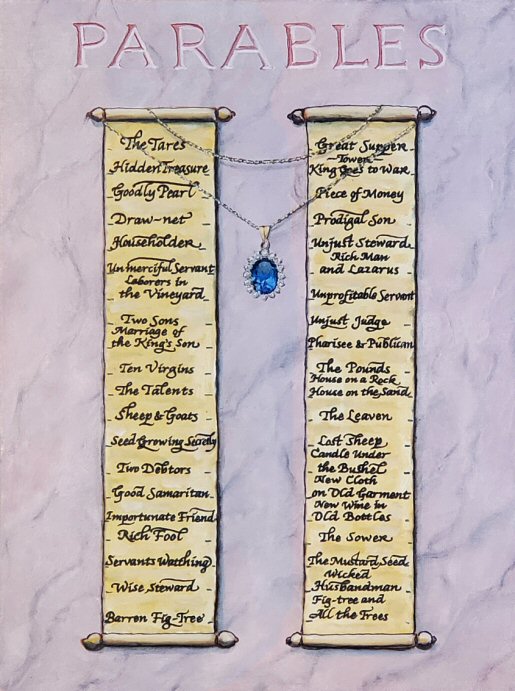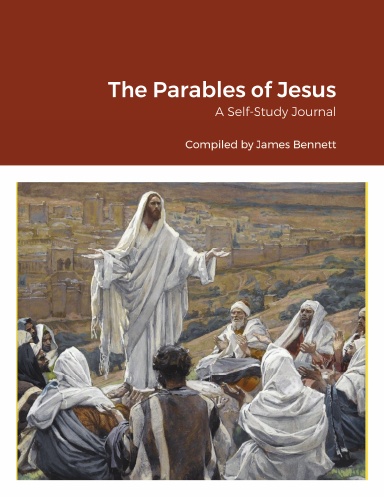|
Jesus spoke all these things in parables to the multitudes; and without a parable, he didn’t speak to them, that it might be fulfilled which was spoken through the prophet, saying, “I will open my mouth in parables; I will utter things hidden from the foundation of the world.” -- Matthew 13:34-35 A parable is a short allegorical story designed to illustrate or teach some truth, religious principle, or moral lesson. The characters in a parable are people and not animals as in fables which are also allegorical stories. The list of the parables on the Bible Selection page gives the scripture reference for the first verse of each parable. This list has forty-one parables; however, it is difficult to count the parables exactly because some are just one sentence in length which seems too short for some people to count as a complete parable. There are also differences in wording from one gospel to another. Another problem is some Bible scholars see two parables where others see only one. An example of the latter are the parables titled New Cloth on Old Garment and New Wine in Old Bottles. They are two illustrations of the same message. Are they one or two parables? Putting aside the subject of the complexity encountered in giving an accurate count of the parables, I believe the important point about the parables is that they contain the central core of Christ’s teachings. I see the parables as lessons in how to live fulfilling, purposeful lives. If you study only one thing in the Bible, I encourage you to study the parables.  The painting for this lesson depicts
two scrolls which when rolled up would be small enough
to place in one’s pocket. The painting for this lesson depicts
two scrolls which when rolled up would be small enough
to place in one’s pocket. Scrolls are said to be emblems of wisdom and the teachings of the Apostles. The scrolls are seen unrolled on a pink marble surface. Marble is believed to signify clarity, self-control and stability both physically and emotionally. It is used as a symbol of purity and immortality. A blue sapphire pendant on a silver chain links the two scrolls together as a single unit. The sapphire of heavenly blue signified the height of celestial hope and faith, and was believed by the ancient mystics to bring protection, good fortune and spiritual insight. If you are not familiar with the parables (or if you feel like you need a refresher), I suggest you begin by studying the following eight parables: Running through the parables I see three central themes: First, the kingdom of God is at hand which means it is right here and now. Recognizing that this is true and realizing that we each have a place within the kingdom is something to seek with all earnestness. Committing ourselves to attaining an understanding of what the kingdom of God means is the most worthwhile pursuit we can undertake. I believe that Jesus taught that we are already part of the kingdom. We only need to recognize our true place within God's kingdom. Many of the parables describe what the kingdom of God is like. The second theme is related to the first: all of us, regardless of our backgrounds, are united as one -- represented in the parables as either members of a family or as neighbors. Third are the several parables which have to do with money and personal possessions. Jesus definitely challenges our attitudes toward ownership of personal property.  I
have compiled a guided self-study of the parables
which I actually put together to facilitate my own
study. It is based on the belief that the best way to
study the parables is to begin by studying them on
your own, and, only after you have done that, read
what others have written about them. Using this
journal, you'll be able to read all the parables and
record your thoughts. I
have compiled a guided self-study of the parables
which I actually put together to facilitate my own
study. It is based on the belief that the best way to
study the parables is to begin by studying them on
your own, and, only after you have done that, read
what others have written about them. Using this
journal, you'll be able to read all the parables and
record your thoughts.CLICK HERE for
details. Some of the parables can be troubling and even seem to teach a lesson that is contrary to other teachings of Jesus. For me the parable of the Unjust Steward is very problematic because it appears that dishonesty is rewarded. Perhaps this parable is meant to challenge our attitudes toward finances. It certainly challenges mine! If you have trouble understanding any of the parables, I suggest first meditating on what it says and afterwards read commentaries. There are innumerable books written on the parables; however, it is not always easy to find a book that you will like. For me, one parable stands out as especially meaningful – the parable of The Prodigal Son in which one of the sons tries to live completely on his own, satisfying his selfish desires, but soon comes to realize that his life is in shambles and he must return to his family. The father in the parable does not give up on the son but every day watches for the wayward son to return. When the son finally does return, the father runs out to embrace him and welcome him home.  CREATE A FREE ONLINE JOURNAL -- CLICK HERE or HERE 
    Copyright, James Bennett 2021 |
